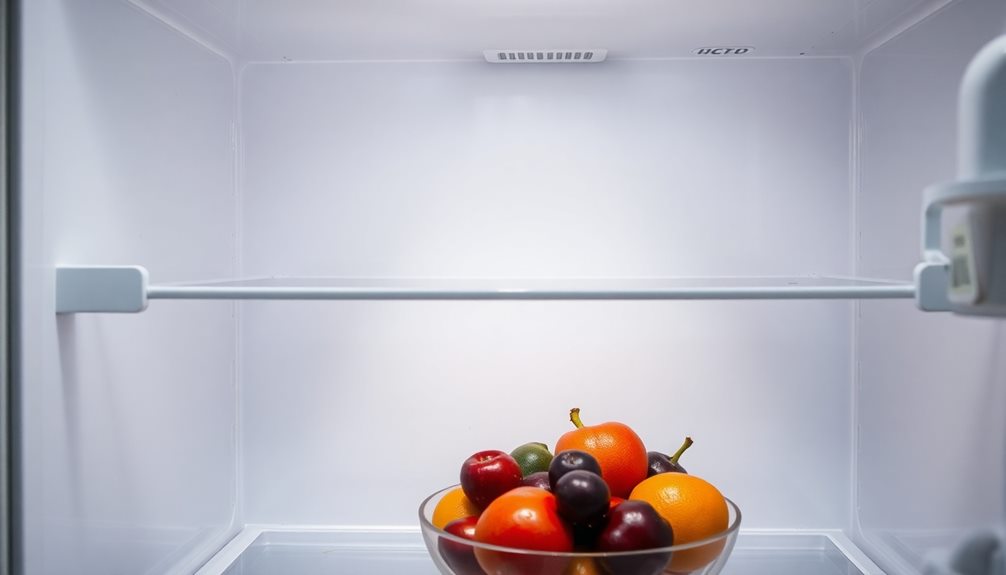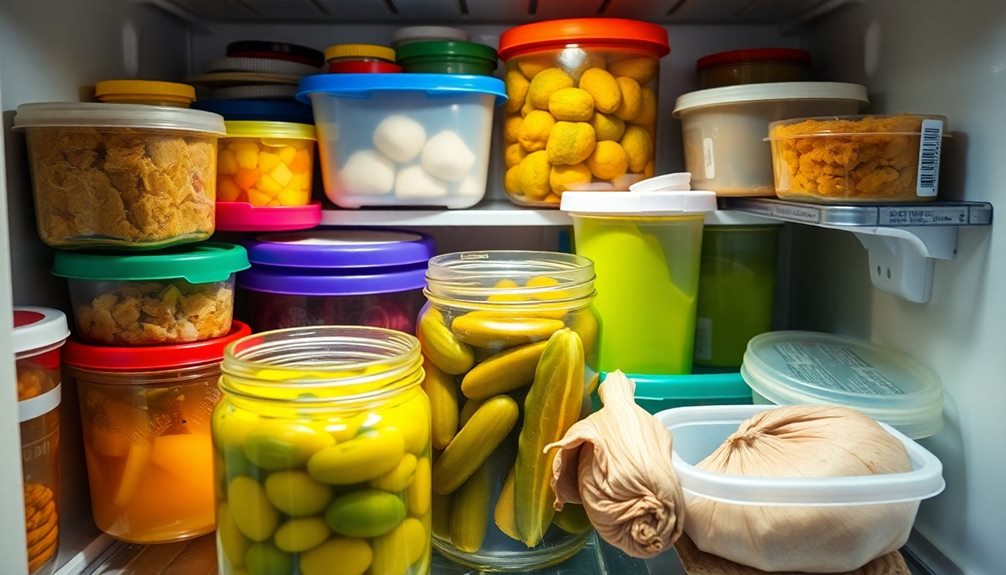Your fridge might still smell bad after cleaning due to hidden spills, mold growth, or improperly sealed food containers. You could be overlooking places like the drip pan or under shelves where grime accumulates. Expired or spoiled food items can also release unpleasant odors. Inconsistent temperatures can worsen the issue, promoting bacterial growth. If your cleaning routine isn't thorough or frequent enough, stubborn odors might linger. Consider using natural deodorizing solutions like baking soda or charcoal. For more persistent smells, exploring deeper reasons behind the odor can lead you to a fresher fridge experience.
Key Takeaways
- Hidden spills or residues under shelves may still harbor odors if not thoroughly cleaned during the initial cleaning process.
- Improperly sealed containers can allow smells to escape and mix, leading to persistent odors in the fridge.
- Mold growth in hidden areas, such as the drip pan or seals, can continue to produce bad smells despite surface cleaning.
- Expired condiments or food items might have been overlooked and can contribute to ongoing odors.
- Inconsistent fridge temperatures can lead to food spoilage and resultant smells, necessitating regular monitoring for optimal freshness.
Common Causes of Odors
When it comes to the unpleasantness of fridge odors, understanding the common causes can make all the difference. Spoiled food is often the primary culprit, particularly expired and rotten produce. If you don't promptly discard these items, they can lead to persistent smells that linger.
Additionally, spills from sticky or strong-smelling liquids can create lingering odors if you don't clean them up thoroughly. Mold growth is another sneaky source of bad smells, hiding in places like behind shelves or inside drip trays. These musty odors can be tough to eliminate.
Improperly sealed containers can also contribute to the problem; when odors escape and mix, they create a cumulative effect that's hard to ignore. Lastly, air circulation issues can exacerbate odor retention and distribution. If your fridge is overcrowded or disorganized, it can hinder airflow, allowing smells to settle and linger.
Importance of Thorough Cleaning

To tackle those pesky fridge odors, you need to do a thorough cleaning.
Start by removing all items so you can spot hidden spills and residues that might be causing the smell.
Don't forget to pay extra attention to the areas where plastic meets glass, as these spots often trap grime and odors.
Hidden Odor Sources
Over time, hidden odor sources in your fridge can accumulate, turning a simple cleaning task into a more significant challenge. If you're still facing unpleasant odors, it might be time for a more thorough inspection. Here are some common culprits:
| Hidden Odor Source | Solution |
|---|---|
| Spills under shelves | Remove shelves and scrub thoroughly |
| Expired condiments | Check expiration dates and discard |
| Mold or mildew | Inspect corners and drainage system |
| Dirty drip pan | Clean the drip pan with warm, soapy water |
While surface cleaning helps, it often misses these hidden odor sources. Cleaning the drip pan and inspecting areas where plastic meets glass, like door seals, are vital steps. Spoiled items tucked away in the back can also lead to lingering smells. Regular deep cleaning, which involves removing all items and thoroughly scrubbing both compartments, is essential to tackle these issues. By addressing these hidden sources, you can effectively eliminate odors and enjoy a fresher fridge. Don't overlook these areas during your cleaning routine!
Incomplete Cleaning Techniques
Regular cleaning of your fridge is essential, yet many overlook the importance of thorough techniques. Incomplete cleaning techniques, like neglecting hidden areas such as the drip pan or seals, can allow bacteria and mold to thrive, contributing to unpleasant odors.
If you don't remove all food items during cleaning, you're likely to miss spills or spoiled food remnants that can lead to lingering smells.
To effectively clean the refrigerator, it's vital to schedule regular cleanings. Sporadic efforts can allow odors from unnoticed spills or expired items to accumulate over time.
Additionally, using improper cleaning agents may not neutralize odors effectively. For instance, relying solely on water won't eliminate bacteria, which thrive in moist environments.
Instead, thoroughly scrub surfaces with a mixture of vinegar and water. This not only cleans but also acts as an odor absorbent, helping to neutralize odors and prevent them from returning.
Checking for Spoiled Food

You need to regularly inspect the food items in your fridge, especially those stored in the door, as they spoil faster.
Make it a habit to check expiration dates and toss anything that's past due; spoiled milk or eggs can really stink up your fridge.
Sniffing and visually checking all items helps you catch hidden spoilage before it becomes a bigger issue.
Inspect Door Items
Many food items stored on the fridge door, like milk and eggs, can spoil quickly due to temperature fluctuations. To keep your refrigerator smelling fresh, it's crucial to regularly inspect these items for any signs of spoilage. High-risk foods, particularly condiments and dairy products, can develop unpleasant odors if left unchecked.
Start by sniffing each item and visually inspecting them closely. Look for any changes in color, texture, or consistency that indicate spoilage. Systematically check everything from the front to the back of the fridge door to guarantee you don't overlook anything that could be contributing to bad odors.
Also, remember that unsealed or improperly stored items are prime suspects for releasing unpleasant smells. Make sure all food containers are tightly sealed to minimize spoilage and maintain freshness.
If you find any spoiled food, toss it out immediately to prevent further odor issues. By regularly inspecting the items in your fridge door, you'll greatly reduce the chances of lingering smells and keep your refrigerator a more pleasant place for your food.
Check Expiration Dates
Although it might seem tedious, checking expiration dates is essential for maintaining a fresh-smelling fridge. Items like milk and eggs can spoil quickly, leading to nasty fridge odors that linger even after you clean your fridge.
To keep your fridge organized, inspect high-risk items such as leftovers, condiments, and dairy frequently. A systematic approach helps you spot expired food that might hide in the back. Start at the front of each shelf and work your way back, checking each item for expiration dates.
Don't forget to examine those condiments that often sit in the door. When you find expired food, discard it promptly. Doing so not only helps eliminate unpleasant smells but also keeps your fridge environment clean and fresh.
An organized fridge makes it easier to monitor freshness and prevents spoiled items from being overlooked.
Deep Cleaning Techniques

A fridge's cleanliness is vital for maintaining a fresh environment and preventing unpleasant odors. To effectively deep clean your fridge, start by removing all items and shelves. This will allow you to access hidden areas and guarantee every surface gets a thorough scrubbing. Mix warm water with white vinegar for an effective cleaning solution, as vinegar can help absorb odors and eliminate bacteria.
Don't forget to clean the drip pan, which often collects excess moisture and residue. Neglecting this area can lead to persistent smells. Schedule monthly deep cleanings to keep odors at bay and promote a welcoming space in your fridge.
| Problem | Solution |
|---|---|
| Fridge still smells | Remove all items and shelves |
| Hidden residue | Use warm water and vinegar |
| Dirty drip pan | Clean the drip pan regularly |
| Excess moisture | Wipe surfaces thoroughly |
If your fridge still smells after deep cleaning, it might be time to consult a professional. There could be hidden mold or mechanical issues at play, and addressing those is vital for maintaining that fresh environment you desire.
Role of Temperature Control

Keeping your fridge at the right temperature is crucial for preventing bad odors. An ideal range between 35°F and 37°F helps inhibit bacterial growth, a primary cause of foul smells. When temperature control is inconsistent, you risk higher humidity levels, which can exacerbate odor issues.
To maintain freshness, use a thermometer to monitor internal temperatures, ensuring your fridge operates within the preferred range. If you notice persistent odors even after cleaning, check your temperature settings. Inadequate cooling can lead to food spoilage, contributing to those unwanted smells.
Regularly adjusting the temperature based on seasonal changes is also important. As temperatures rise outside, your fridge may need extra cooling to combat the heat and humidity that can affect the freshness of food in your fridge.
Make it a habit to keep track of your fridge's temperature. Small fluctuations can make a big difference in odor retention. By maintaining stringent temperature control, you not only prevent bad odors but also extend the life of the food in your fridge, ensuring it stays fresh and appealing.
Don't underestimate the significance of temperature in achieving a clean-smelling fridge!
Inspecting the Drip Pan

The drip pan, often tucked away at the bottom of your fridge, can be a hidden source of unpleasant odors. Many people overlook it during routine cleaning, but this small area can accumulate spills and food particles, leading to significant odor buildup.
If you haven't checked your drip pan in a while, it's time to inspect it. Start by removing the drip pan, which is usually located at the bottom or beneath your appliance.
Once you have it out, clean it thoroughly using warm soapy water and a sprinkle of baking soda. This combination effectively neutralizes foul odors trapped within. If you skip this step, you might find mold growing in the pan, adding a musty smell to your fridge environment.
Regular inspection and maintenance of the drip pan is crucial for keeping your refrigerator smelling fresh. Make it a habit to check it every few months, and you'll avoid the trouble of persistent odors.
Natural Deodorizing Solutions

After taking care of the drip pan, you might wonder how to further tackle any lingering odors in your fridge. Fortunately, there are several natural deodorizing solutions that can help you keep your fridge smelling fresh. One effective option is to place an open box of baking soda inside. It absorbs unwanted odors for up to three months.
Additionally, incorporating natural sources of fiber can aid in overall digestion, which helps reduce food spoilage odors. Alternatively, you can use activated charcoal by putting bags or containers in the fridge to neutralize strong smells.
If you love coffee, placing an open bowl of fresh coffee grounds in the fridge not only absorbs odors but also adds a pleasant scent. Another great option is lemon juice; wiping down surfaces with a mixture of lemon juice and water can refresh the air, or you can leave lemon wedges in the fridge for a natural boost.
Lastly, consider adding fresh herbs like mint or basil to your fridge. They not only mask unpleasant odors but also impart a lovely fragrance.
With these natural deodorizing solutions, you'll keep your fridge smelling fresh and inviting!
When to Call a Technician

Persistent bad odors in your fridge can be more than just an annoyance; they might signal deeper issues that need attention. If you're dealing with persistent odors even after cleaning, it's time to contemplate calling a technician. Here are some signs that indicate professional help is necessary:
| Signs to Call a Technician | Description |
|---|---|
| Mold Growth | Look for mold around seals or hidden areas that regular cleaning hasn't reached. |
| Malfunctioning Components | If you hear unusual noises alongside bad smells, you might have mechanical problems. |
| Cooling Efficiency Issues | Frequent food spoilage despite proper storage can indicate cooling issues needing assessment. |
Ignoring these signs could lead to more significant problems down the line. An appliance technician can help diagnose the underlying issues causing those persistent odors, whether it's mold growth or malfunctioning components. Additionally, they can provide effective odor prevention solutions to keep your fridge smelling fresh. Don't hesitate to reach out for professional help; it's better to address these concerns early rather than dealing with costly repairs later.
Long-term Maintenance Tips

Maintaining a fresh-smelling fridge goes beyond just occasional cleanings. To guarantee long-term maintenance, regularly inspect the drip tray, as it can trap moisture and lead to unpleasant smells. Cleaning this area frequently will help prevent odor accumulation that often goes unnoticed.
Schedule monthly deep cleanings for both the fridge and freezer compartments to eliminate hidden food remnants and bacteria. This proactive approach tackles potential odor sources before they become a problem.
Keep an open box of baking soda or activated charcoal inside your fridge at all times to absorb unwanted smells and maintain that fresh environment you desire.
It's equally important to store all food items in airtight containers. This simple step minimizes odor escape and prevents cross-contamination between strong-smelling foods.
Additionally, monitor and maintain your fridge temperature between 37°F and 40°F. This range inhibits bacterial growth, prolongs food freshness, and reduces the likelihood of foul odors.
Frequently Asked Questions
Why Does My Fridge Smell Even Though I Cleaned It?
Your fridge might still smell because hidden spills or expired food are lurking in hard-to-reach spots. Check for moisture sources and guarantee proper temperature settings to keep odors at bay and maintain freshness.
How Do I Get Rid of Lingering Smell in My Refrigerator?
To get rid of lingering smells in your refrigerator, clean all surfaces with warm soapy water and vinegar, use baking soda or activated charcoal to absorb odors, and regularly check filters and the drip pan.
Why Does My Fridge Smell but Nothing Is Rotting?
Did you know that around 25% of fridges contain hidden mold? If your fridge smells but nothing's rotting, check for mold behind shelves, expired condiments, or improperly sealed containers. Bacteria thrive in unclean spots too.
How Long Does It Take for a Fridge to Stop Smelling?
It usually takes a few hours to a couple of days for your fridge to stop smelling after cleaning. If odors linger longer, consider checking for hidden spills or using odor absorbers like baking soda.
Conclusion
So, even after a thorough clean, that pesky fridge smell might still linger. It's like finding a hidden sock in the laundry—sometimes, the source is elusive. By checking for spoiled food, inspecting the drip pan, and adjusting the temperature, you can uncover those hidden culprits. Remember, natural deodorizing solutions can work wonders, too. With regular maintenance, you'll keep your fridge fresh, making it a pleasant surprise every time you open the door.









